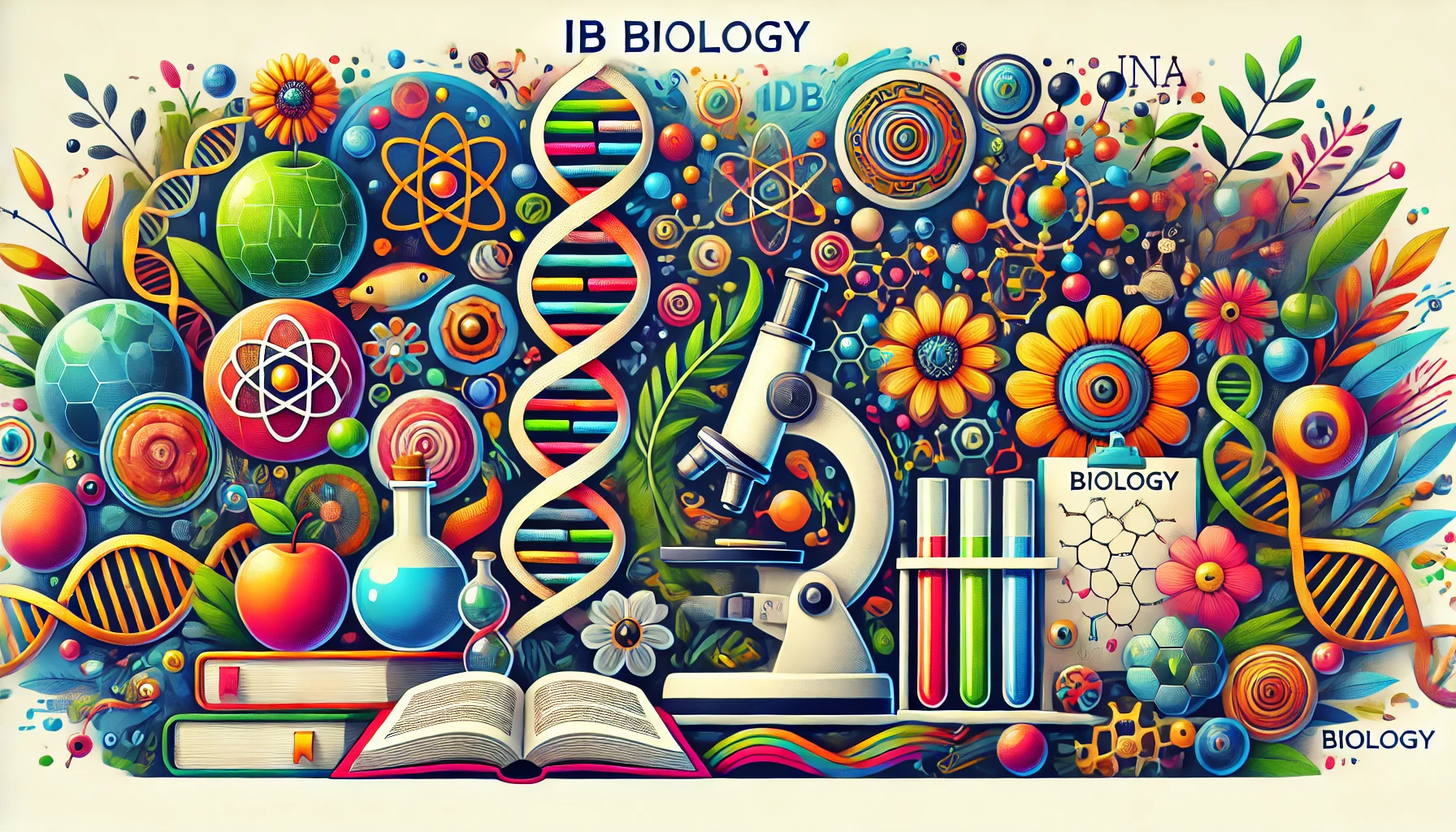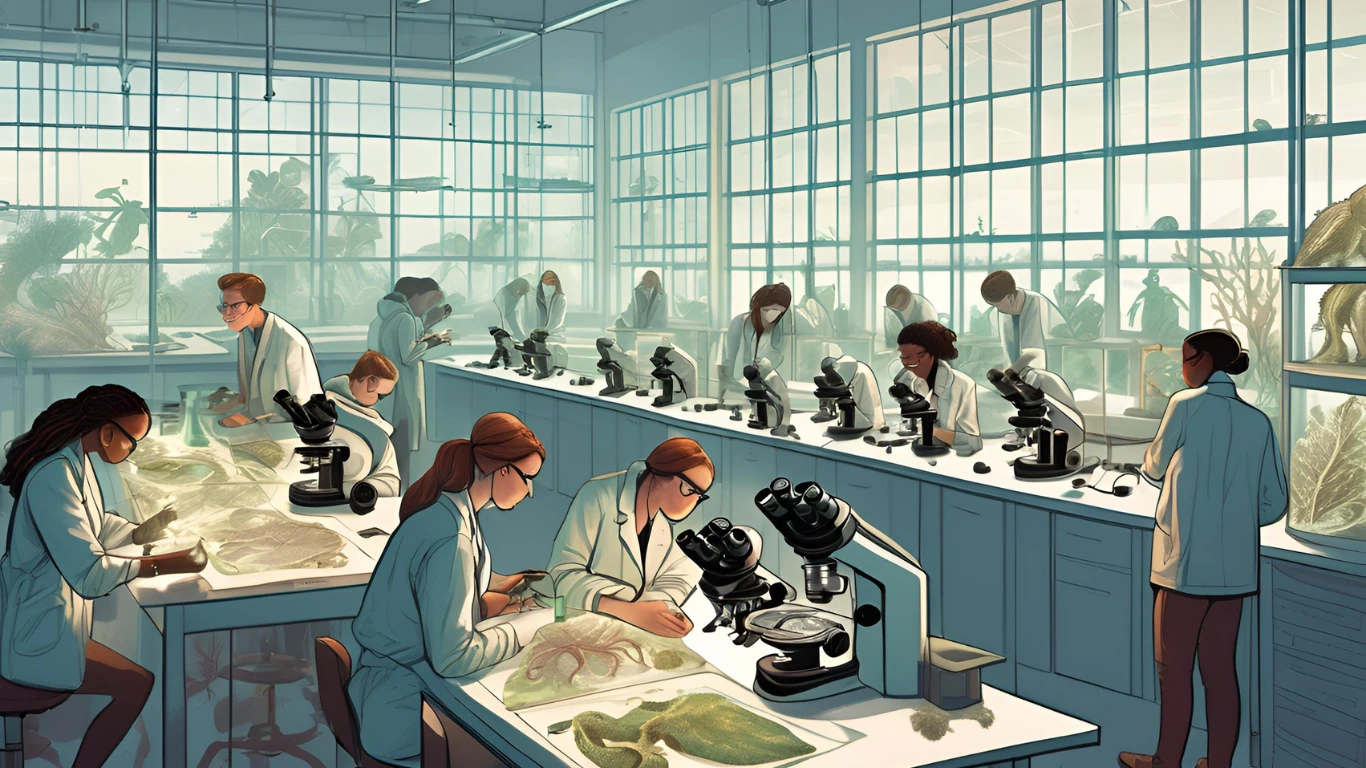

The International Baccalaureate (IB) Diploma Programme (DP) offers a unique approach to education, fostering a global perspective and critical thinking. As part of this program, IB Biology is designed for students aged 16-19 who are ready to dive into an in-depth study of living organisms, the complexity of life, and our interactions with the environment.
In this comprehensive guide, we’ll cover everything you need to know about IB Biology. From the essential topics and skills you’ll master to the assessments and how this course prepares you for future studies, you’ll gain a solid understanding of what IB Biology entails. Whether you're a student preparing for the course or simply curious about what makes IB Biology distinct, this blog will walk you through all the key details.
Structure of the IB Biology Course
The IB Biology course is designed to develop a broad understanding of biological principles through conceptual themes, inquiry-based learning, and practical experimentation. Students can take the course at either the Standard Level (SL) or Higher Level (HL), with different requirements in terms of depth and breadth.
- Standard Level (SL): Approximately 150 teaching hours, aimed at building a solid foundation in biology principles and practical skills.
- Higher Level (HL): Approximately 240 teaching hours, designed for students who wish to pursue further studies in biology or related sciences. This level includes additional topics and a deeper exploration of the core themes.
In both levels, students engage in an experimental program and participate in a collaborative sciences project, reinforcing the course’s emphasis on practical application and global collaboration.
What topics are covered in IB Biology?
In the IB Biology syllabus, topics are organised into themes that reflect major biological concepts. These themes offer a lens through which to view the subject, connecting smaller concepts and ensuring that students can see the relationships between biological levels—from molecules to ecosystems. Each theme also explores the impact of biology on human life and the environment, grounding theoretical knowledge in practical, real-world applications.
The course is divided into four main themes:
- Unity and Diversity – This theme explores the shared characteristics and diversity of life, from molecular structures to evolutionary processes.
- Form and Function – This theme investigates how biological structures are adapted for survival and functionality within organisms and ecosystems.
- Interaction and Interdependence – This theme focuses on the interactions within organisms and between organisms and their environments.
- Continuity and Change – This theme addresses the mechanisms of heredity, evolution, and how living things adapt over time.
What skills and techniques are you getting assessed on during IB Biology?
The IB Biology course is structured to foster not only a deep understanding of biological content but also to equip students with essential scientific skills. These skills are integral to the course and are woven throughout each topic, forming the foundation for effective inquiry, experimentation, and analysis in biology. They are categorised into three primary tools (Experimental Techniques, Technology, and Mathematics) and three stages of inquiry (Exploring and Designing, Collecting and Processing Data, Concluding and Evaluating).
Core Skills and Techniques
- Experimental Techniques
- Students learn the basics of conducting safe and ethical experiments, which include techniques like accurate measurement, systematic data collection, and using a range of laboratory equipment.
- Skills here encompass the preparation of samples, use of light microscopy, chromatography, molecular modelling, and conducting biochemical assays.
- Emphasis is placed on developing precision in observations, accurate calibration of instruments, and working with both qualitative and quantitative data.
- Technology
- Technology skills include using digital tools to collect, analyse, and present biological data.
- Students work with sensors and probes for data collection, use computer models and simulations to visualise biological processes, and apply software for data representation in graphs and tables.
- These skills help students develop efficiency in processing large sets of data and in using digital methods to analyse biological systems.
- Mathematics
- Maths skills are essential for interpreting biological data and include calculations involving ratios, proportions, densities, and averages, as well as using scientific notation.
- Students calculate rates of change, analyse trends, and perform statistical tests like chi-squared tests and t-tests to validate data.
- They learn to apply these techniques to interpret and construct graphical representations, which are crucial for making accurate biological inferences.

The Inquiry Process
The inquiry process is central to the IB Biology curriculum and is divided into three stages:
- Exploring and Designing
- In this stage, students are encouraged to ask questions, frame hypotheses, and design experiments based on scientific reasoning.
- They learn to select relevant research sources, design methodologies with proper control and test variables, and justify the choice of experimental parameters.
- This foundational stage cultivates creativity, critical thinking, and the ability to plan scientifically valid investigations.
- Collecting and Processing Data
- Students gather and process data systematically, with a focus on recording observations accurately, addressing issues that arise during data collection, and ensuring data reliability
- Skills here include using statistical methods to analyse results, interpreting trends, and identifying outliers.
- This stage helps students hone their ability to process and synthesise data to support scientific conclusions effectively.
- Concluding and Evaluating
- In this final stage, students interpret their data, draw justified conclusions, and evaluate the outcomes relative to initial hypotheses.
- They also learn to critique their experimental methods, recognise errors or limitations in their data, and suggest practical improvements for future studies.
- This stage emphasises the importance of scientific integrity, critical reflection, and continuous improvement.
Internal Assessment for IB Biology
The Internal Assessment in IB Biology is a unique opportunity for students to conduct a scientific investigation that accounts for 20% of their final grade. It allows students to take ownership of their learning by designing, conducting, and analysing an experiment based on a research question they choose. The IA is more than just a report; it’s a chance for students to develop essential scientific skills and explore a biological topic that interests them.
What’s Involved in the Biology IA?
The IA focuses on a scientific investigation, where each student formulates a research question and plans an experiment to explore it. The investigation must involve quantitative data collection (although qualitative observations can support findings) and requires a detailed report of up to 3,000 words. The scope of topics is broad, allowing students to investigate diverse areas of biology through laboratory work, field studies, database research, or simulations.
Steps in the IA process:
- Formulating a Research Question: Students identify a focused, researchable question that can be explored through experimentation.
- Designing the Methodology: Planning the experiment involves selecting variables, establishing controls, and addressing safety, ethical, and environmental concerns.
- Collecting Data: Students gather quantitative data relevant to their question, using appropriate tools and techniques.
- Analysing Results: Data is processed, analysed, and presented in a clear format, with relevant statistical methods applied.
- Drawing Conclusions: Based on the data, students conclude and contextualise their findings within the broader scientific understanding.
What Is Being Assessed?
The IB assesses the IA based on four main criteria:
Each criterion is scored on a scale of 0 to 6, with a maximum possible score of 24 points.
Why the IA Matters
The Biology IA is more than a simple project; it emphasises the application of scientific methods, problem-solving, and critical analysis. By taking on the IA, students develop skills in scientific investigation, from generating hypotheses to interpreting data, all while engaging in a topic they’re passionate about. The experience prepares students for further scientific study, equipping them with the rigour and skills required in the biological sciences.
External Assessment for IB Biology
The external assessment for IB Biology consists of two main papers (Paper 1 and Paper 2) that test a range of skills, from knowledge recall to analytical thinking. The requirements differ for Standard Level (SL) and Higher Level (HL) students, reflecting the greater depth of study in HL.
External Assessment Structure
The external assessment for IB Biology comprises the following components:
Standard Level (SL)
Higher Level (HL)
What is Being Assessed?
The external assessments evaluate students' proficiency across three assessment objectives, which together ensure a well-rounded understanding of biological science.
- AO1: Knowledge and Understanding
- Students are tested on their understanding of biology terminology, facts, concepts, skills, and methodologies. This objective encourages them to recall and explain biological knowledge accurately, which is fundamental to further analysis.
- AO2: Application of Knowledge
- This objective evaluates how well students can apply their biological knowledge to solve problems, analyse trends, and understand novel situations. Application-based questions test students' ability to use theoretical knowledge in practical contexts, an essential skill for real-world biology applications.
- AO3: Analysis and Synthesis
- Analytical skills are assessed by requiring students to interpret and evaluate data, make predictions, and synthesise information across different areas of biology. This component is critical for developing scientific thinking and problem-solving skills.
Each objective is assessed across both papers. Paper 1 generally tests AO1 and AO2 through multiple-choice and data-based questions, while Paper 2 emphasises AO2 and AO3 with short-answer and extended-response questions that demand a deeper analysis.
Importance of the Assessment Objectives
The assessment objectives highlight the IB’s commitment to a comprehensive science education. By focusing on knowledge recall (AO1), practical application (AO2), and analytical skills (AO3), the IB Biology course ensures students are not only knowledgeable in biology but also skilled in critical thinking and scientific inquiry. These skills prepare students for university-level biology and foster lifelong scientific literacy.
Additional Exam Information
- Use of Calculators: Calculators are permitted in both papers, reflecting the need for accurate calculations in data analysis and allowing students to tackle complex quantitative questions confidently.
- Inclusive Access: The IB provides inclusive access arrangements to ensure that all students can demonstrate their abilities fairly under assessment conditions.
What is the difference between SL and HL for IB Biology?
The IB Biology course offers two levels: Standard Level (SL) and Higher Level (HL), catering to students with varying academic goals and commitments. While both levels share a core foundation, HL students delve deeper into certain topics and are expected to connect concepts across broader biological themes. Here’s a breakdown of the main differences in a concise table.
The distinction between SL and HL reflects both breadth and depth of content, with HL designed to prepare students for further study in biology or related fields. The increased hours and content mean HL students develop more complex, interconnected understanding, which aids them in connecting topics across different areas of the syllabus.
How to succeed in IB Biology
We have spoken to our tutors and summarised their advice on how to succeed in IB Biology. Here are some top tips, both for the subject in general and specifically for excelling in the final exams:
- Understand the IB Command Terms: Familiarise yourself with IB command terms like "describe," "explain," and "evaluate." Knowing what each term means will help you understand what’s expected in responses, especially in the exam.
- Master the Key Concepts: Biology in the IB is organised around overarching themes and core concepts. Focus on understanding these big ideas as they connect multiple topics and help with both theoretical and practical applications.
- Integrate Your Learning Across Topics: The IB Biology syllabus is designed to interlink different areas of biology. Try to make connections across themes like molecular biology, genetics, and ecology to help with understanding complex questions and developing a deeper grasp of the subject.
- Practice Experimental Skills: Hands-on skills are essential. Pay attention during labs and practical sessions, as this experience will aid in the Internal Assessment (IA) and help with data-based questions in exams. Experimentation also helps reinforce concepts.
- Prioritise Data Analysis Skills: A significant portion of the exams involves interpreting and analysing data. Practice reading graphs, tables, and data sets and drawing logical conclusions based on these.
- Develop Problem-Solving Skills: In Biology, unexpected questions test your understanding rather than memorised facts. Regularly engage in problem-solving exercises to improve your critical thinking and adaptability to new scenarios.
- Stay Consistent with Study Routines: Biology requires consistent study. Aim to review and consolidate information frequently, rather than cramming before exams. Use concept maps, summaries, and flashcards to reinforce learning.
- Practice Past Papers: Working through past papers gives insight into exam format, the style of questions, and how topics are tested. Time yourself to simulate exam conditions and learn to manage your time effectively.
- Understand the Assessment Objectives (AOs): IB Biology assesses knowledge recall, application, and analysis (AO1, AO2, AO3). Understand how these objectives apply to different question types and practice accordingly.
- Plan for the Internal Assessment (IA): For the IA, select a topic that genuinely interests you to stay motivated. Focus on clear research questions, robust methodology, accurate data collection, and well-supported conclusions. Be mindful of the criteria, as the IA contributes significantly to your final grade.
- Seek Feedback on Your Work: Regular feedback from teachers on your IA drafts and practice answers will help refine your understanding and performance. Pay attention to areas for improvement and work on those diligently.
- Use Visuals to Support Learning: Diagrams and visual aids are particularly helpful in biology. Use drawings, flowcharts, and diagrams to explain processes, pathways, and structures, as these will also help in diagram-based questions in exams.
- Manage Exam Time Well: In the exams, prioritise time between different sections, and don’t spend too long on one question. Answer the questions you’re confident about first, then return to more challenging ones.
- Pay Attention to Ethics and Safety: In both coursework and exams, consider ethical implications and safety guidelines in experimental contexts, as IB emphasises these aspects.
- Stay Curious and Engaged: Finally, stay engaged with biology outside of class. Reading scientific articles, exploring real-world applications, and understanding the latest advancements will not only make learning more enjoyable but also help you develop a deeper understanding of biological concepts.

What are the common mistakes that IB Biology students make?
Even the most dedicated students can fall into certain traps in IB Biology. Here are some common mistakes to avoid:
- Relying on Memorisation: Biology involves understanding processes and systems, not just memorising facts. Students who focus solely on memorization often struggle to apply their knowledge in exams, especially with data-based and application questions.
- Overlooking Command Terms: Many students miss points because they don’t fully address what the command terms (like "evaluate" or "compare") require. Pay close attention to these terms to ensure you’re meeting the question's demands.
- Neglecting Practical Skills: The Internal Assessment and exam questions often test experimental skills. Failing to practice lab work or data interpretation can hurt students who are well-prepared theoretically but lack practical experience.
- Ignoring Connections Between Topics: IB Biology themes are interlinked. Focusing on topics in isolation can make it hard to answer questions that require knowledge from multiple areas, so work on connecting ideas across the syllabus.
- Mismanaging Exam Time: Many students spend too long on one question or don’t allocate enough time for extended-response sections. Practice timed exams to improve your pace and ensure you can complete all questions effectively.
- Skipping Past Papers: Avoiding past paper practice can leave students unprepared for the exam format and question styles. Regular practice with these will help build confidence and familiarity with the types of questions asked.
FAQs
What’s the difference between SL and HL in IB Biology?
Standard Level (SL) covers the core concepts of biology with about 150 teaching hours, while Higher Level (HL) includes additional, more advanced topics over 240 hours. HL is more in-depth, preparing students for further studies in biology or related sciences.
Is getting a 7 in IB Biology hard?
Achieving a 7 in IB Biology is challenging but possible with dedication and effective study habits. Success depends on consistent study, mastering key concepts, connecting topics, and practicing data-based questions and past papers to understand the exam format.
How much does the Internal Assessment (IA) contribute to my final grade?
The IA accounts for 20% of your final grade in IB Biology. It involves conducting a scientific investigation on a topic of your choice, which helps build practical research skills and apply theoretical knowledge.
What skills will I develop in IB Biology?
IB Biology emphasises scientific inquiry, critical thinking, data analysis, and practical lab skills. You’ll also learn to design experiments, analyse data, and evaluate your findings, preparing you for advanced science studies.
How should I prepare for the External Assessment?
Regularly practice past papers, focus on understanding the IB command terms, and review data-based questions. Building a study routine and making connections across themes will also strengthen your understanding and exam performance.
What topics are covered in IB Biology?
The IB Biology syllabus is organised into four themes: Unity and Diversity, Form and Function, Interaction and Interdependence, and Continuity and Change. These themes cover a broad range of biology, from molecules and cells to ecosystems and evolution.
Conclusion
IB Biology is a challenging yet rewarding course that equips students with a thorough understanding of biological concepts and the skills needed to succeed in future scientific endeavours. By mastering the course structure, understanding assessment criteria, and developing strong study and practical skills, students can excel in both the Internal and External Assessments. Avoiding common pitfalls and following the guidance provided can make a significant difference in your performance and enjoyment of the course. Whether you’re aiming for a high score, preparing for university-level science, or simply passionate about biology, IB Biology offers a valuable foundation that fosters critical thinking, curiosity, and a lifelong appreciation for the living world.




